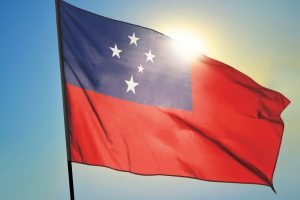Samoa’s former prime minister and longest serving leader, Tuila’epa Sailele Maliegaoi, is attempting to retain power in the face of a court order naming his opposition, Fiame Naomi Mata’afa, the new leader following April’s election. His efforts have been deemed an “insult” to Samoa’s hard-won democracy.
Tuila’epa’s refusal to step aside went as far as his party locking the door to parliament, leaving Fiame and other newly elected members of government to be sworn on the lawn in front of parliament.
The news quickly made it onto the front page of newspapers around the world. Headlines proclaim that Samoa is facing a “bloodless coup,” Samoa is a “democracy in crisis,” and Samoa “is sliding into autocracy.”
Beyond the headlines, however, governments have been exceptionally careful with their words so as not to add fuel to the fire.
Henry Puna, the secretary-general of the Pacific Islands Forum, an intergovernmental organization representing the region, encouraged “all parties to pursue peaceful means to resolve their difficulties” but refrained from referring to Fiame as Samoa’s new prime minister in a statement last week.
In its statement on the situation, the Republic of the Marshall Islands also fell short of recognizing Fiame as the new leader. Many other Pacific Island nations have not commented on the saga at all.
The unfolding events even caught the attention of nations well outside the Pacific Island region, too. The United Kingdom’s Minister for the Pacific Zac Goldsmith called on all parties to respect democratic process, and to work together peacefully in the Samoan way. The U.S. State Department also urged Samoa’s leaders to respect the democratic process and resolve their differences peacefully.
Chinese Foreign Ministry spokesperson Zhao Lijian, responding to a question from a reporter about who Beijing considers the legitimate prime minister of Samoa, said: “Committed to the principle of non-interference in others’ internal affairs, we believe that Samoa has the capability and wisdom to properly handle its domestic affairs.”
New Zealand Prime Minister Jacinda Ardern and Australian Foreign Minister Marise Payne have also been asked whom their respective countries consider to be the prime minister of Samoa.
Both responded vaguely, with Ardern simply saying: “We call for all parties in Samoa to continue to uphold the rule of law and demonstrate respect for the democratic purpose” and Payne noting that the outcome is still being contested in the courts and that Australia will respect that process.
Fiame, however, said she expected Australia and New to back her and denounce the “bloodless coup.”
“I think [Australia and New Zealand] need to be a little stronger. Because this is a government in place, it is an interim government. But they need to be given the message that people are looking on how they conduct this,” Fiame told ABC radio.
The Federated States of Micronesia, meanwhile, was quick to announce its formal recognition of Fiame as the newly elected prime minister of Samoa.
“As the FSM is itself a democracy,” President David W. Panuelo said in a statement, “that both upholds and promotes democratic values, it is imperative that we show our friends—especially during their darkest hours—that we stand with them. Samoa is a cherished friend and Pacific neighbour; recent weeks have been very troubling for the Samoan People, who have been witnessing what is arguably a Constitutional and Political crisis.”
Panuelo later told the ABC: “The FSM announced its support for the newly sworn-in Prime Minister Fiame for the same reasons that we denounce former U.S. President Donald Trump for his embrace of fascism and rejection of democracy… Australia and New Zealand, and the Pacific Islands Forum for that matter, all have important economic and cultural ties with Samoa [but] I can disagree with them for being silent for now.”
Others were also quick to embrace Fiame as Samoa’s new leader. Dr Hilda Heine, former president of the Republic of the Marshall Islands tweeted: “Congratulations PM Fiame Naomi Mata’afa! Stay strong and unwavering in your legitimacy as the duly elected Samoa PM! The facts of the election stand.”

































